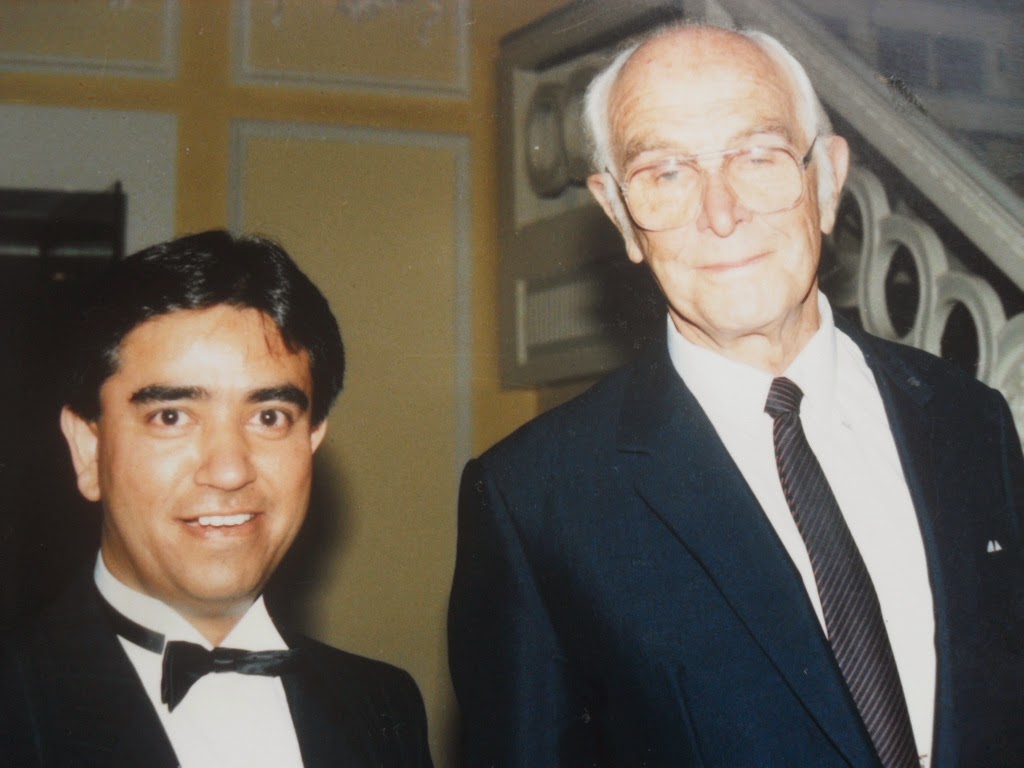Review: SERENGETI LIVES ON (Satis Shroff)
Review:
Bernhard
Grzimek: Serengeti Lives On (Satis Shroff)
Photo © Satis Shroff with
Bernhard Grzimek at the La Redoute, Bad Godesberg, October 21, 1986
'WHY is Grzimek so interesting now?'
you might ask. The reason is a film by Roland Suso Richter
(screenplay by Marco Rossi) on the life of the charismatic nature
conversationalist and documentary filmer.
The German actress Barbara Auer plays
the role of Bernhard Grzimek's first wife Hilde, who depicts a
courageous, unhappy person. After World War II she helped build the
Frankfurter Zoo with her husband Bernhard. She raised the sons
Michael and the adoptive son Thomas. Another son named Rochus doesn't
feature in the film at all. Hilde, a faithful soul in real life, was
considerate towards her husband, even though she was aware of
husband's amorous affairs with other women. She allowed her husband
to go to Africa with son Michael under the condition that he bring
him safely back. Alas, Michael 24, lost his life while flying his
zebra-striped Dornier Do 27 after a collision with a vulture in
January 1959. Michael's widow Erika (played by Katharina Schüttler)
assisted Bernhard to finish the film, which received the oscar for
the Best Documentary Film in 1960.
However, that was not the end of the
story. The storyline is also about the turmoils in the soul of
Bernhard Grzimek. The story is about how he put her under pressure to
set him free, and threatened
to curb her finances. On the other
hand, she threatened back to let the world know about his Nazi past
(NSDAP membership). Grzimek had good contacts with the Nazi
photograph Leni Reifenstahl. The film shows Grzimek as a father who
didn't come up to the expectations as in the case of the adoptive
child Thomas, who chose to end his life in jail, in the case of the
illegitimate daughter Monika, with whom he buries the hatchet and has
good relations later. As expected, the director dramatizes the love
affair between Bernhard and Erika, whom he marries, and as a result
of the marriage to his daughter-in-law, he becomes the adoptive-Dad
of his own grandchildren.
It was in 1974 and there was a conflict
going on in what is today the Langtang National Park. The fierce
Khampas, with arms supplied by the CIA to fight Mao's troops in
Tibet, had crossed the Himalayas and retreated to Nepal's Langtang
area, where they were reported to have created a lot of problems with
the Nepalese inhabitants. I was a journalist then with Nepal's
biggest English daily The Rising Nepal and wrote an article 'Langtang
Must Not Die.' You could hear the Nepalese Air Force plane bringing
Royal Gurkha troops to the Himalayas. The article was well received
in Kathmandu.
I had no idea that one day I'd be
meeting Bernhard Grzimek of 'Serengeti Must Not Die' fame, the famed
German vet, zoo director, behavioural researcher and maker of
documentary films. He was a prolific author, oscar-winner and a
pioneer of ecological movement, a man who did a lot for nature
conservation in his days. Grzimek was born in 1909 and died in 1987.
We met at the La Redoute in Bonn at a reception, held by King
Birendra and Queen Aishwarya of Nepal, which was graced by the then
President of the Federal Republic of Germany Richard von Weizsäcker
and his wife Marianne.
Grzimek's aim was to save animals in
their natural habitat. Serengeti, which lies in Tanzania, was to be
reduced to half its size when Bernhard Grizmek and his son Michael
arrived in Africa in 1957 for the first time. The reason for denuding
the 14,600 square km Serengeti park was to have more grazing land for
the domestic animals. Bernhard and Michael wanted to fight against
this tendency for they knew that once the wild animals had been
killed they'd never come. The film 'Serengeti Must Not Die' became
famous and the national park in Tanzania has not died. The park
brings good revenue through visitors from all over the world, which
is necessary for maintaining and running the park with its rangers
and equipment. To protect wild animals he even made pacts with
African dictators. On another occasion, he also filmed crowded
chicken farms to expose how badly the chicken were kept.
Much like the Chitwan park in Nepal,
Serengeti also brought adverse effects upon the denizens of the park,
as well as the people living in the vicinity. The human incursion of
people living near national parks is a well-known problem. Poaching
has always been another problem, and the people in the Serengeti
were, and still are, discontented that more was being done for
wildlife than for humans in the area. There are no big roads, no
circular roads through and around the park which actually is a good
thing, as far as environmentalists are concerned, but the people want
infrastructure and transport connections. Parks and reserves are like
protected islands that are surrounded by cultural landscapes, where
people have settled down. There are no buffer-zones between the
reserves, national parks and human settlements, and as a result you
have human incursions into the park territory. Creating such
buffer-zones gives wild flora and fauna space to grown and survive
without any molestation from outside. When food gets sccarce in the
parks due to the encroachment on the part of humans, it is only
natural that the fauna visit human settlements to pull night-raids
foraging for food. This enrages the villagers or settlers. A vicious
circle ensues. In the so-called Third World people live on a
day-to-day basis. The survival equation 'what shall I eat next?'
dominates.
A moving, dramatic family history
worthy of a family therapy scenario. A must see movie.



Kommentare
Kommentar veröffentlichen